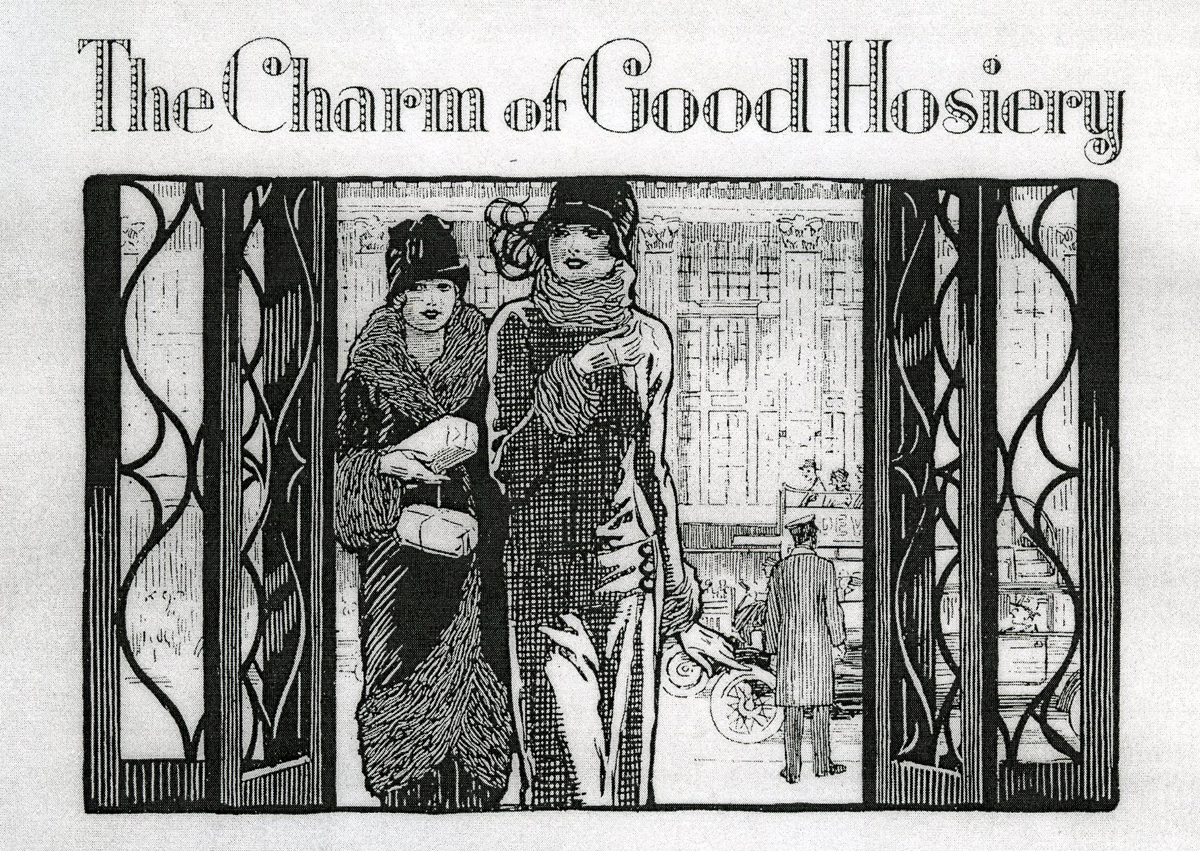Growing Businesses
The end of the nineteenth century saw an upturn in the British and world economy. Growth in I. & R. Morley's sales created a turnover of £3.06 million from a workforce of 8364 employees, a considerable proportion of whom (3,950) still worked from home.
In Leicester, Corahs was a leading firm in the town. The company employed 2500 factory workers in 1891, and reached a turnover of £598,000. Production concentrated on the growing outerwear market for cardigans, jumpers and jackets.
The domination of the industry by I. & R. Morley ended in 1920 when Wolsey took the lead as the industry's biggest firm. Two Leicester hosiery manufacturers, Robert Walker and Sons and W. Tyler, Sons & Co. merged together with Boswell Brown, a London-based merchant house selling to retailers. With the purchase of spinning mills in the West Riding of Yorkshire, Wolsey became a vertically integrated company with the ability to receive materials into one division of the company and process goods through to the retailer. Mergers in the British industry had been rare and the industry remained mainly composed of small firms. In contrast, the merger of firms into single companies had been common in Germany and the US since the nineteenth century. Size enabled companies to benefit from economies of scale, thereby allowing them to compete more effectively.

Corah's Advert
Financing new enterprise
New firms continued to crowd into the industry in boom periods. Some employees, with their knowledge of the industry, set up independently. A good example is John Hall, a foreman in a Hinckley knitting factory, who saved up £500 out of his £2 a week wage and borrowed £500 from a local bank in order to set up a factory in Stoke Golding, near Hinckley in 1882. The company produced fine quality socks and continues today as H J Hall & Son. By 1930, the foundation of small companies had increased the number of factories operating in the industry to 1,392.
Individuals with assets to act as a security found that banks were willing to lend money to them to start up a new business. Banks in Leicester were more supportive of entrepreneurs than Nottingham banks and led to many new businesses being located in Leicester. The low credit rating and greater risk associated with new firms often led to higher interest rates being charged and restrictions placed on loan amounts. John Henry Bull of Nottingham founded his business in 1879 to produce a range of goods on circular machines. The business survived until 1892 when Bull went bankrupt, attributing the bankruptcy to a lack of capital and borrowing at high interest rates.
Foreign entrepreneurs move in
In the 1920s and 1930 foreign enterprise came to Britain. Howard Ford, a menswear retailer, started to import flesh-coloured stockings from the US in 1920. These sold well and a factory was set up in Liverpool four years later. With the brand name, 'British Bear Brand Luxury Stockings', the company soon became Britain's largest producer of stockings. Kayser Bondor is another example of a company that built its business by importing affordable US stockings for the mass market. A further wave of company arrivals occurred in the 1930s when Jewish families fled Nazi persecution in Germany. The Djanogly Brothers moved to Mansfield, Noskwith (Charnos) to Ilkeston, H.Dessau & Co. to Nottingham, and Louis Goldsmith to Leicester. British companies increasingly cut trade links with Nazi Germany and this further prompted the move to Britain.
The home of the knitting industry?
A major change occurred in the knitting industry during the twentieth century when the East Midlands ceased to be the automatic choice for the location of a factory. The pull of the London fashion market reasserted itself, particularly in women's hosiery, between the wars. The availability of workers and cheap redundant cotton mills in Lancashire saw the knitting industry expand there to employ 9,500 by 1935. Companies arriving from Germany or principally involved with imports from overseas often did not have established links with the East Midlands and were able to set up where economic circumstances were favourable. The location of the London warehouses encouraged companies to locate in the south east. Pasold Brothers set up their factory in Langley, Buckinghamshire, Klinger was founded in Edmonton, and Ballito in St Albans.